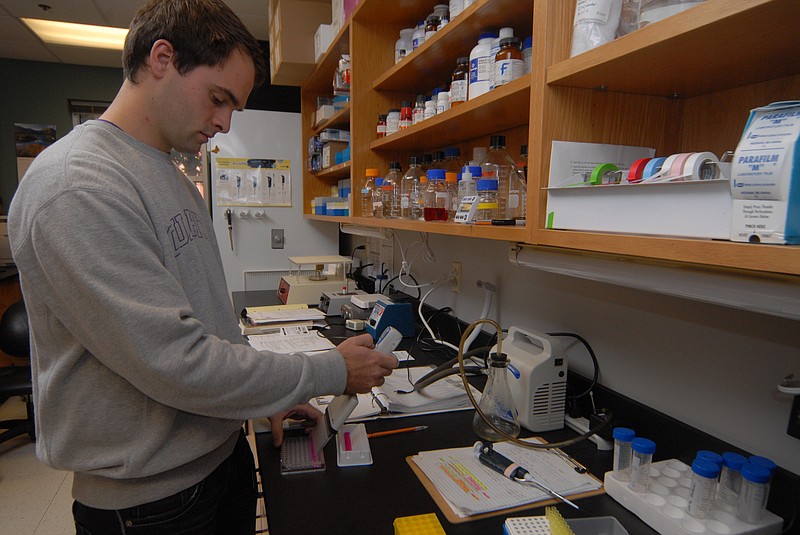BENTON — If anyone asked Ryan James of Benton what he did for his summer vacation, his answer, “I worked on curing cancer,” would probably draw some attention.
James, under the direction of his teacher, Lori Hensley, associate professor of biology and holder of the J.D. Patterson Chair in Biology at Ouachita Baptist University in Arkadelphia, spent weeks conducting research on a drug that has shown promise in treating tumor cells.
During this past summer, more than 30 Ouachita students and faculty worked on research projects both on and off campus, said Tim Knight, the dean of OBU’s J.D. Patterson School of Natural Sciences.
“Our goal is to provide research experiences for our students that set them apart from their peers,” said Knight, who is also a professor of biology.
Hensley said students and faculty at Ouachita Baptist have worked for 11 years under a program aimed at getting students into scientific research early in their college careers.
In 2002, the research program began to receive funds from the Arkansas IDeA Network of Biomedical Research Excellence, funded by the National Center for Research Resources and the Institutional Development Award Program.
“It has transformed the study of science at Ouachita,” Hensley said. “We have received more than $2 million in funding for three project leaders at OBU, as well as equipment, all funded by INBRE.”
During the summer, Hensley and her student assistant continued her research on a drug known as ajulemic acid, or AJA. Her earlier research has shown that the drug could kill Ewing-sarcoma tumor cells without harmful side effects.
Hensley called Ewing sarcoma an aggressive form of pediatric bone cancer with only a 20 percent survival rate.
“AJA is a cannabinoid that has anti-tumor properties,” she said. “We have focused on how and why AJA can kill tumor cells and leave healthy cells intact.”
In addition, Hensley said that in order for cancer cells to grow, they often tap into a person’s blood supply with the formation of new blood vessels.
“This summer, we wanted to figure if AJA could stop blood-vessel growth,” she said. “We were able to create tumor-like growth in the lab, and we used the drug on it and tested the results.”
James, a senior biology major, said he wanted to work with Hensley.
“It fascinated me to know somebody was curing cancer at Ouachita, in the science building where I take classes every day,” he said. “I wanted to be a part of it and to make a difference.”
James said he expected the project to make a huge breakthrough.
“Then we would announce the discovery and write a huge paper,” he said. “I found out research makes small steps, and the next step of this work will have to come later. I was humbled by that.”
The results were not as successful as the team had hoped, Hensley said.
“I don’t think we found that [AJA] inhibited blood-vessel growth,” she said. “However, we are seeing some progress in treating tumors in mice. The tumors are regressing. We can kill individual cells and stop the cancer cells from migrating.”
She said students get a real-life look at biomedical research.
“Our students pick up the technology quickly and can plan the next step, but they learn that research is not an 8-to-5 job,” Hensley said.
“Sometimes you start an experiment, and you have to check it at 2 a.m. They also find out why it is called re-search. If you get a result, you have to get the same result three times for it to be valid.”
James said he enjoyed being part of the process.
“Sometimes you have to discover the little things and rule out certain possibilities in order to pave the way for the next person down the road,” he said.
Other research projects conducted at OBU in the summer included testing the ability of cranberry juice and mouthwash to inhibit what the researchers called biofilm formation.
“The study of biofilms has increased drastically in recent years, due to the awareness of the impact of biofilms on natural and industrial systems, as well as human health,” according to a statement from Ruth Plymale, assistant professor of biology at Ouachita Baptist, who led the research, in a release about the summer program at OBU.
For more information about the research program and the Patterson School of Natural Sciences, contact Dean Tim Knight at knightt@obu.edu, or call (870) 245-5528.
Staff writer Wayne Bryan can be reached at (501) 244-4460 or wbryan@arkansasonline.com.
